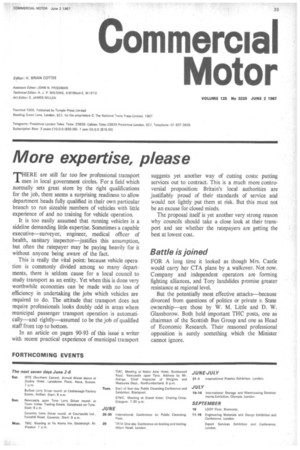More expertise, please
Page 35

If you've noticed an error in this article please click here to report it so we can fix it.
TrTHERE are still far too few professional transport 1 men in local government circles. For a field which normally sets great store by the right qualifications for the job, there seems a surprising readiness to allow department heads fully qualified in their own particular branch to run sizeable numbers of vehicles with little experience of and no training for vehicle operation.
It is too easily assumed that running vehicles is a sideline demanding little expertise. Sometimes a capable executive—surveyor, engineer, medical officer of health, sanitary inspector—justifies this assumption, but often the ratepayer may be paying heavily for it without anyone being aware of the fact.
This is really the vital point: because vehicle operation is commonly divided among so many departments, there is seldom cause for a local council to study transport as an entity. Yet when this is done very worthwhile economies can be made with no loss of efficiency in undertaking the jobs which vehicles are required to do. The attitude that transport does not require professionals looks doubly odd in areas where municipal passenger transport operation is automatically—and rightly—assumed to be the job of qualified staff from top to bottom.
In an article on pages 90-93 of this issue a writer with recent practical experience of municipal transport suggests yet another way of cutting costs: putting services out to contract. This is a much more controversial proposition: Britain's local authorities are justifiably proud of their standards of service and would not lightly put them at risk. But this must not be an excuse for closed minds.
The proposal itself is yet another very strong reason why councils should take a close look at their transport and see whether the ratepayers are getting the best at lowest cost.
Battle is joined
FOR A long time it looked as though Mrs. Castle would carry her CTA plans by a walkover. Not now. Company and independent operators are forming fighting alliances, and Tory landslides promise greater resistance at regional level.
But the potentially most effective attacks—because divorced from questions of politics or private v. State ownership—are those by W. M. Little and D. W. Glassborow. Both hold important THC posts, one as chairman of the Scottish Bus Group and one as Head of Economic Research. Their reasoned professional opposition is surely something which the Minister cannot ignore.




























































































































































